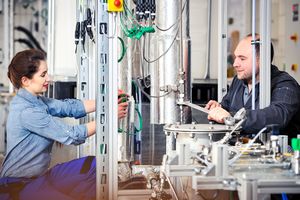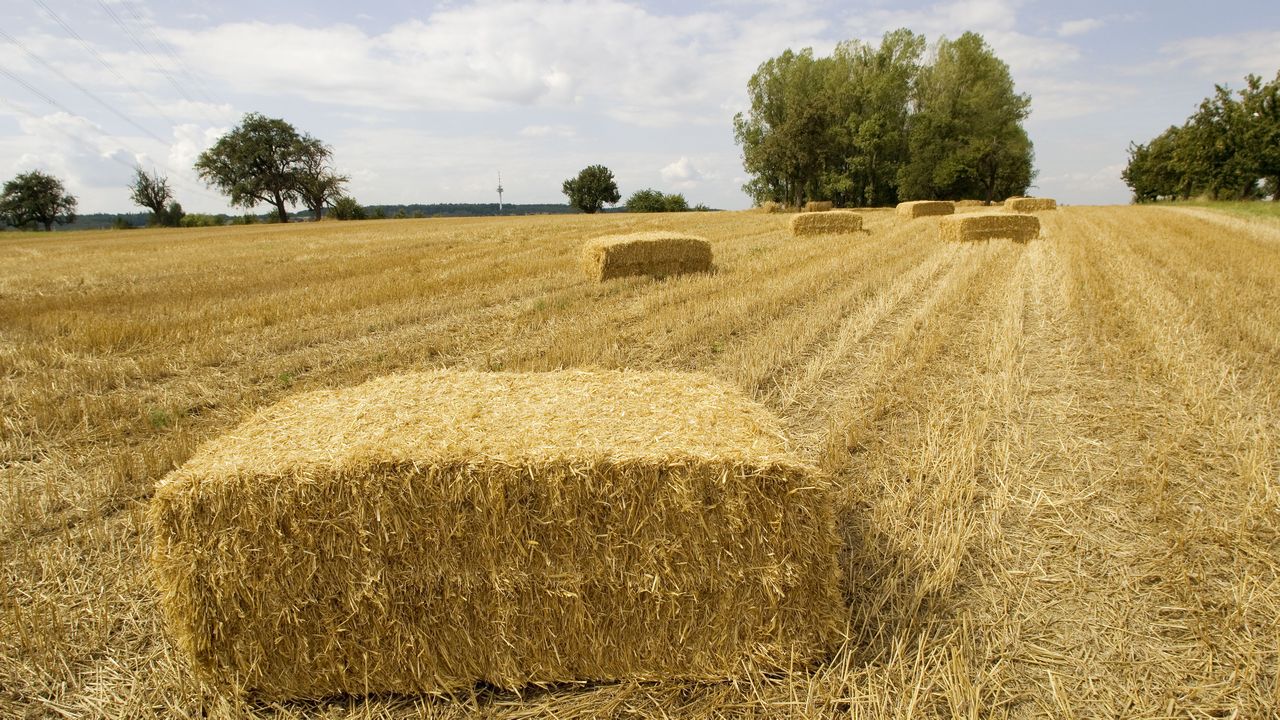The Karlsruhe Institute of Technology (KIT) and the University of Hohenheim are setting up a biorefinery farm. Their joint initiative is targeted at finding economic and sustainable technical solutions for the use of biogenic residues: Small biorefineries, located on farms, supply materials and energy carriers, close cycles locally, and contribute to the protection of nature and climate. At the “Unterer Lindenhof” experimental station of the University of Hohenheim, the partners are expanding an existing biorefinery plant, bringing together technological innovations.
Besides conventional agricultural products, the farm of the future will also produce basic chemicals from plant biomass. Basic chemicals serve as source material for plastics and fuels that will be produced elsewhere. Residues from those processes will in turn be utilized for generating energy in a biogas plant and end up back on the fields as fertilizer. This is the vision of a team of scientists led by Professor Andrea Kruse, conducting research on the conversion technologies for biobased resources at the University of Hohenheim, and Professor Nicolaus Dahmen from KIT’s Institute of Catalysis Research and Technology. Their common objective is to establish a biorefinery farm that uses plant residues and agricultural by-products for the production of a broad range of materials and energy carriers without competing with food production.
“Cascading different processes in an efficient way allows us to refine biomass, along the entire value chain, into foodstuff, animal feed, different types of materials, chemicals, and energy,” says Dahmen. However, the benefit of biorefineries not only lies in the capability to produce several products at the same time, but also in their contribution to the protection of nature and climate. “In the process of making plastics, new materials, or fuels from biomass, carbon is sequestered,” Kruse explains. “If these biogenic products are then burned at the end of their useful life to generate energy, only the same amount of carbon dioxide is released as would be produced by the natural decomposition of the plant source material. This will not only save on fossil fuels, but also reduce CO2 emissions.”
Pilot Plant Converts Biomass into Platform Chemicals
A major goal of this project in the current Science Year 2020/21 of the Federal Ministry of Education and Research, which focuses on bioeconomy, is to close energy and material cycles locally. “Essentially, is about combining physico-chemical process technologies with biological and biotechnological processes in a multifaceted way,” says Dahmen. To this end, the Karlsruhe and Hohenheim researchers are expanding an existing biorefinery plant at the “Unterer Lindenhof” experimental station of the University of Hohenheim. Once in operation, this pilot plant will show how biomass can be converted to the greatest extent possible into platform chemicals.
Wood, straw, and grasses contain lignocellulose as a structural substance. In the biorefinery, lignocellulose is broken down into its individual components, i.e. cellulose, hemicellulose and lignin, which are then used separately by coupling a lignin splitting process devised by KIT with a process from the University of Hohenheim for the utilization of lignocellulose. This produces, among other substances, furfural and phenols, which can be used, for example, to manufacture biogenic and thus formaldehyde-free chipboard and plywood products.

The University of Hohenheim and KIT will conduct future joint
research at the biorefinery pilot plant. (Photo: University of Hohenheim/Max Kovalenko)
Another example of the approach of converting biomass into intermediate products in a decentralized manner and then processing these products centrally is the bioliq® process designed by KIT: Synthetic fuels and basic chemical products are produced from dry biomass. The by-products are heat and electricity, which can be used to cover the energy requirements of the process. In order to avoid energy and cost-intensive transports, the bioliq® concept combines the decentralized production of biosyncrude, a high-energy intermediate product, with its central conversion to synthesis gas (syngas). Syngas is then refined to obtain the desired end product.
Coupling food production and the manufacturing of plastics for packaging purposes is the key objective of Professor Andrea Kruse's on-farm biorefinery concepts in Hohenheim. For example, biomass is used to produce hydroxymethylfurfural (HMF), a base product for the production of food packaging, beverage bottles, fibers for car seats, sportswear, car parts, and others.
Small Facilities Ensure Sustainability at the Regional Level
However, a farm-based biorefinery is not intended to combine all process steps in a single facility. The aim is to have facilities that are as small as possible, so that nutrients can be returned directly from the farm to the fields. To enable even small facilities to operate economically, further processing of the intermediate products will be done in larger factories. Thus, sustainability can be ensured at the regional level.
More about the KIT Energy Center: https://www.energie.kit.edu
In close partnership with society, KIT develops solutions for urgent challenges – from climate change, energy transition and sustainable use of natural resources to artificial intelligence, sovereignty and an aging population. As The University in the Helmholtz Association, KIT unites scientific excellence from insight to application-driven research under one roof – and is thus in a unique position to drive this transformation. As a University of Excellence, KIT offers its more than 10,000 employees and 22,800 students outstanding opportunities to shape a sustainable and resilient future. KIT – Science for Impact.

